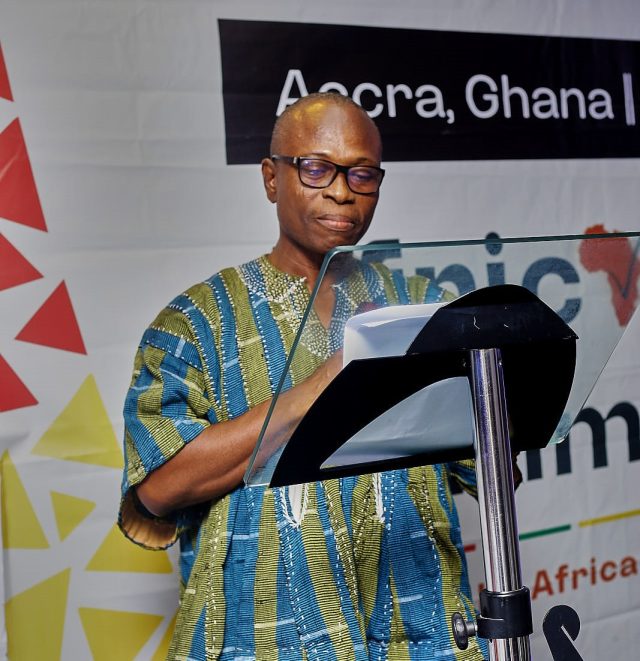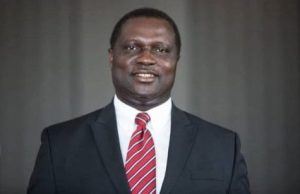The Executive Director of NewsBridge Africa and Managing Editor of Ghana Business News, Emmanuel K. Dogbevi, has called for the establishment of a United Nations Special Court for Crimes Against Journalists, in a powerful and impassioned speech at the Africa Check Awards, in Accra.
The proposal aims to address the escalating violence, intimidation, and impunity faced by journalists across Africa, a continent where the right to free expression is increasingly under threat.
A special UN court for crimes against journalists has the potential to curtail impunity, Mr. Dogbevi said. Drawing parallels with the Special Court for Sierra Leone and the International Criminal Tribunal for the former Yugoslavia, he emphasized that this international tribunal could bring justice in cases where journalists have been attacked, jailed, or killed for simply doing their jobs.
Mr. Dogbevi, who is also the Vice President of The African Editors Forum (TAEF), cited the unresolved murders of Cameroonian journalist, Martinez Zogo, and Ghanaian journalist, Ahmed Hussein-Suale.
“There are some 67 journalists in jail around Africa, and they were mostly reporting corruption,” Mr. Dogbevi said, noting the dangers journalists face for holding power to account.
He said governments across the continent have passed cyber and communication laws that have been used to arrest and detain journalists. The situation, he stressed, is particularly dire where there have been military take-overs like Mali, Burkina Faso, and Niger.
“The freedom of journalists to operate among others has been severely curtailed, and some have gone missing. The level of impunity and lawlessness exhibited by political office holders in the mistreatment of journalists, are counter to the ideals of free and progressive societies,” he said.
He said while journalists remain the last bastion against corruption, impunity, and the decline of free speech, at the same time, the challenges confronting journalists continue to increase. The fall in advertising revenues; emergence of AI; and a growing lack of interest in high impact, high quality news, he added, put the journalist in a difficult situation.
“The question then is: Should the journalist serve the public interest or what the public is interested in? What the public wants might not necessarily serve its interest. But generating engagement, getting the numbers, clicks and traffic accounts for some revenue.”
Against this backdrop, he urged journalists to be innovative, doing so without compromising the fundamental requirements for establishing the truth, the ethics of the profession and the wholesomeness of the facts.
“No democracy in the true sense and form would survive anywhere without free expression and independent journalism including fact-checking,” he added.
Reflecting on the occasion, Africa Check Awards, he commended the fact-checkers being honored but acknowledged the severe risks they face in verifying facts. “In many countries in Africa, by simply fact-checking information, you are susceptible to arrests, detention, torture, and in some cases, you could even be killed,” he said.
“No democracy in the true sense and form would survive anywhere without free expression and independent journalism including fact-checking,” he added.
Mr. Dogbevi also lamented the continent’s deteriorating political and economic situation while referencing The Economist’s 2011 “Africa Rising” report.
He said “the democratic atmosphere and economic trajectory that The Economist saw when it made that bold declaration have all whittled away. Africa has made some steps forward, but not as much as it was expected to, when that statement was made.”
“Even Ghana, my beloved country, the once great example of a democratically progressive country with a bright economic future has seen decline in its economy, with a heavy debt burden resulting from bad governance and mismanagement.”
“There are some 67 journalists in jail around Africa, and they were mostly reporting corruption,” Mr. Dogbevi said, noting the dangers journalists face for holding power to account.
The country once lauded as the symbol of a successful multiparty state, he said, is now lagging in the fundamentals of a democratic society. “State agencies like the police and military continue to flagrantly abuse the rights and liberties of citizens with the active collusion of the courts.”
He also noted that the impact of the COVID-19 pandemic has further strained economies, with 21 African nations now at high risk of debt distress. Public debt levels have surged, and this year alone, African countries are expected to pay some $163 billion in interest on loans.
As Africa’s youth population is expected to reach 450 million by 2050, Mr. Dogbevi raised concerns about the future awaiting the next generation. “What is the future like for the young people of Africa?” he asked.
In response to this plethora of difficulties, he entreated journalists to be innovative, doing so without compromising the fundamental requirements for establishing the truth, the ethics of the profession and the wholesomeness of the facts.
He argued that journalists at all times must stay true to the principles and values of the profession. “Journalists must strive to operate above reproach and in all cases seek to establish the facts as much as they can, beyond doubt.”
By Kizito Cudjoe
Copyright ©2024 by NewsBridge Africa
All rights reserved. This article or any portion thereof may not be reproduced or used in any manner whatsoever without the express written permission of the publisher except for the use of brief quotations in reviews.
















